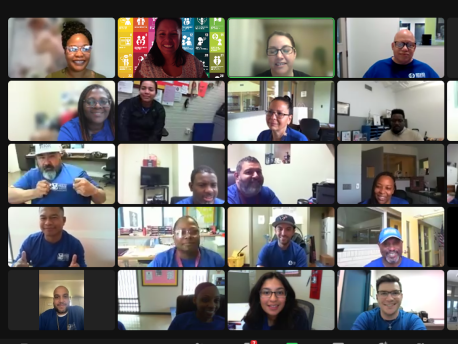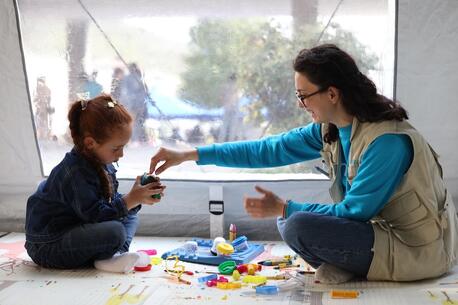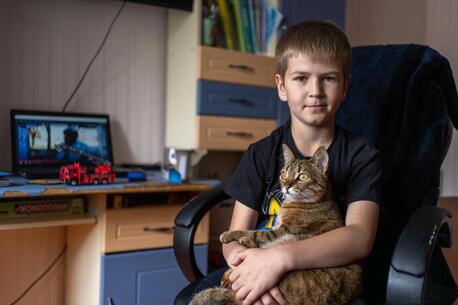
UNICEF Working With City of Houston to Improve Child Mental Health
As part of UNICEF's Child Friendly Cities Initiative, the City of Houston is prioritizing the mental health of young people in the community.
The City of Houston has embarked on a two-year process toward recognition as a UNICEF Child-Friendly City. UNICEF's Child Friendly Cities Initiative (CFCI) was launched globally in 1996 to protect children’s rights in an increasingly urbanized and decentralized world, and UNICEF USA is piloting the two-year initiative here in the United States with five cities and one county. The initiative brings UNICEF and local stakeholders together to establish safer, more just, equitable, inclusive, and child-responsive cities and communities.
An important part of this initiative in Houston is the CFCI Youth Council composed of young leaders from diverse backgrounds who conduct research, propose policy and youth programming, and host events to create space for youth to make their voices heard.
UNICEF's Child Friendly Cities Initiative amplifies the voices and concerns of young leaders in the community
To begin the CFCI process, the City of Houston, led by the Mayor’s Office of Education, completed a local Situation Analysis to assess the state of children’s rights in the city. Community and government assessments were conducted to gather data on children’s issues, child demographics, and youth and community perspectives on how Houston fares in each CFCI goal area.
In the next step of the CFCI process, Houston used the results from the Situation Analysis to complete a Local Action Plan informed by young people and local stakeholders including parents and service providers. This Action Plan provides a vision and framework that advocates for the safety, well-being and success of Houston’s children and their families, with a focus on three priority issues: children’s participation, access to mental health services and child-responsive emergency planning.
To build awareness among the community, Houston completed a three-part series of online workshops to engage community members in the results of their CFCI Situation Analysis and Local Action Plan (see CFCI Action Plan presentation and event recording).
Youth-led discussions shed light on how schools impact mental health
Through the participatory CFCI process, the City of Houston determined improving youth access to mental health services to be a top CFCI priority in the Local Action Plan. Houston’s CFCI leaders and partners have already begun addressing this need for youth mental health support. In honor of Mental Health Awareness Month, the City of Houston hosted multiple trainings and events around how to better support youth mental health.
On May 12, the Houston CFCI Youth Council hosted an event titled “Mental Health in Schools: Youth-led discussion, by youth, for youth.” During this online discussion, youth were able to share valuable experiences about the impact of the school on their mental health and discuss how the education system can better support their mental health. At the end, the high school students received a list of mental health resources.
I appreciated that the youth participants were willing to share their experiences. The Youth Council created a welcoming space for participants, and the young participants were willing to speak up about their mental health. It’s time for our city to listen.”- Carmen, 17
"I loved the interaction and the ability to give other youth an opportunity to speak their minds," said 16-year-old Samiaht. "Being able to discuss with other like-minded youth made me realize other situations that I hadn't been paying attention to." Sixteen-year-old Shay agreed: "I felt comforted because I was able to relate to what the youth were sharing about their struggles, and it made me feel less alone."
Workshops train adults to recognize signs and symptoms of mental health challenges, and share strategies on how to help
In partnership with the Harris Center and Texas Children's Hospital, Houston’s CFCI Task Force and Leadership Team hosted nine youth mental health trainings for adults who work with children and adolescents between the ages of 6 and 18. Training participants learn the common signs and symptoms of mental health challenges and substance use challenges, how to interact with a child or adolescent in crisis and how to connect youth with experiencing trauma.
The Adverse Childhood Experiences and Supporting Children from Traumatic Backgrounds workshop also explains how trauma impacts a child’s brain and body, describes the three pillars of trauma support and ways to implement them with children, and identifies self-care strategies when supporting children from traumatic backgrounds. In a post-training survey, 100 percent of respondents indicated they would recommend this training to others. Both workshops will be held again throughout the summer and fall of 2022.
Through these workshops, Houston has trained more than 400 service providers, educators, community members and parents. Participants include nurses, Parks and Recreation Department staff, Houston Public Library staff, teachers, school administrators, after-school program staff (i.e. YMCA), immigration advocates and faith-based/church staff and pastors. After each training, the City of Houston evaluates participant experiences via surveys and focus groups.
Focus on the connection, and not necessarily the behavior of the child: This was a great takeaway moment for me. — Lara, Houston social worker
Lara, a Houston social worker, said she learned to "Focus on the connection, and not necessarily the behavior of the child: This was a great takeaway moment for me. I enjoyed this training and would love to see more." Taylor, a parent and graduate student, found the workshop invaluable: "It was very emotional for me because I have dealt with childhood trauma as well. During my time as a teacher assistant, I encountered students who showed signs of trauma. After taking this training, I now feel better prepared on my journey to becoming a school counselor."
On May 4, the City of Houston became the first government internationally to adopt the Children’s Bill of Rights in Sports, developed by the Aspen Institute’s Sports & Society Program through its Project Play initiative. This announcement came during the Aspen Institute’s Project Play Summit in Washington D.C. The Project Play initiative seeks to ensure full opportunity and participation of children to play sports, and supports the CFCI goal area of Play and Leisure, which positively contributes to the mental health and well-being of children and youth.
Young leaders in Houston are advocating for legislation to improve mental health services for children and youth
To align their programmatic focus on access to mental health with public policy, Houston youth are starting to advocate for local and federal policy change to improve mental health services in schools. The Mental Health Services for Students Act of 2021 and Pursuing Equity in Mental Health Act are two pieces of legislation focused on improving access to mental health services for children and youth in the United States. You can Help Ensure Mental Health Care Is Accessible to Every Child in the U.S. by taking action here or text MENTALHEALTH4KIDS to 52886. To get involved in local CFCI Houston efforts, sign up for the CFCI Houston newsletter here, and email Maryann Wanjau at mwanjau@unicefusa.org for more info.
Top photo: The City of Houston Parks and Recreation Department staff met virtually for a youth mental health first aid training session with the Harris Center on May 25, 2022. © Laura Cuellar, Houston Mayor's Office of Education
HOW TO HELP
There are many ways to make a difference
War, famine, poverty, natural disasters — threats to the world's children keep coming. But UNICEF won't stop working to keep children healthy and safe.
UNICEF works in over 190 countries and territories — more places than any other children's organization. UNICEF has the world's largest humanitarian warehouse and, when disaster strikes, can get supplies almost anywhere within 72 hours. Constantly innovating, always advocating for a better world for children, UNICEF works to ensure that every child can grow up healthy, educated, protected and respected.
Would you like to help give all children the opportunity to reach their full potential? There are many ways to get involved.





